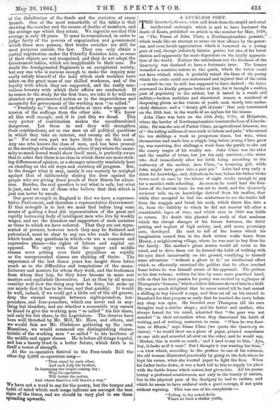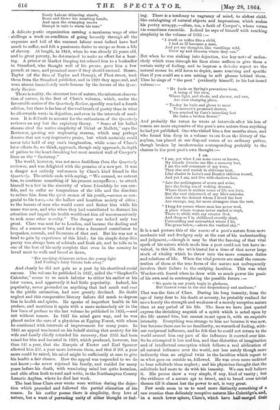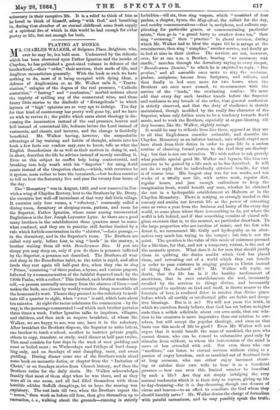A LUCKLESS POET.
THE Quarterly Review, while still fresh from the stupid and cruel intellectual onslaught which is said to have hastened the death of Keats, published an article in the number for May, 1820, on "The Poems of John Clare, a Northamptonshire peasant,". which reads like an attempt to atone for that offence by the gener- ous and even lavish appreciation which it bestowed on a young. poet of real, though infinitely fainter, genius, but also of far lower station and apparently far more dependent on the kindly apprecia- tion of the world. Neither the unkindness nor the kindness of the Quarterly was destined to have a fortunate issue. The former wounded a sensitive nature to the quick, which the writer could not have wished, while it probably raised the fame of the poetry which the critic could not understand and injured that of the critic —a result he can be still less supposed to have desired ; the latter answered its kindly purpose better at first, for it brought a sudden gust of popularity to the author, but it issued in a result still sadder,—broken ambition and disordered reason, a manhood of deepening gloom as the visions of youth sank slowly into melan- choly distance, and a "dreary gift of years" that only terminated on the 20th inst. in the wards of an asylum for the insane.
John Clare was born on the 13th July, 1793, at Helpstone, where the border of Northamptonshire touches the fens of Lincoln- shire. He was the son of Parker Clare, an agricultural labourer, one of "the toiling millions of men sunk in labour and pain," who earned- his ten shillings a week in prosperous times, but who, wheii rheumatism had made him a cripple long before young Clare grew up, was receiving five shillings a week from the parish to eke out the scanty wages of his weakly son. John Clare was the elder and the smaller of twins, but yet the only survivor,—the sister who died immediately after her birth being, according to the' testimony of the mother, Ann Clare, "a bouncing girl, while John might have gone into a pint pot." John had very early a thirst for knowledge, and, delicate as he was, before his father broke . down used to earn by the labour of eight weeks enough to pay for a month's rude schooling. As soon as he could lead the fore- horse of the harvest team he was set to work, and the Quarterly reviewer tells us, on knowledge derived from his mother, that while thus occupied he had the misfortune to see the loader fail from the waggon and break his neck, which threw him into a fit, from the liability to which he did not recover till after a considerable lapse of time, and which even in 1820 was liable to return. No doubt this planted the seeds of that madness which the abrupt changes of his future fortunes, the fitful petting and neglect of high society, and, still more, pecuniary care, developed. He used to tell of the horror which his imagination caused him in the dark winter walks home from Maxey, a neighbouring village, where he was sent to buy flour for the family. His mother's ghost stories would all recur to his mind, and to drive them out he formed the habit of walking with his eyes fixed immoveably on the ground, versifying to himself some adventure "without a ghost in it," an intellectual effort which so effectually exorcised the goblins that he often reached home before he was himself aware of his approach. The preface to his first volume, written for him by some more practised hand, tells us that his first passion for poetry was excited by a glimpse of Thompson's "Seasons," which a fellow-labourer showed him in a field. He was so much delighted that he never rested till he had earned a shilling to buy himself a copy, and then set off on his errand to Stamford for that purpose so early that he reached the town before any shop was open. He brooded over Thompson till his own thoughts took a similar shape ; and his father and mother, who always feared for his mind, admitted that "the gear was not mended "in their estimation when they discovered his habit of writing, and of writing, moreover, in verse. "When he was four- teen or fifteen," says Dame Clare (we quote the Quarterly re- viewer) "he would show me a piece of paper, printed sometimes on one side and scrawled all over on the other, and he would say,
Mother, this is worth so much ; ' and I used to say to him, Aye,
boy, it looks as if it warr1' But I thought it was wasting his time," —a view which, according to the preface to one of his volumes, the old woman illustrated practically by going to the hole where he kept his verses, when she wanted paper to light the fires. When his father broke down, it was a hard toil to him to supply his place with the feeble frame which nature had given him. All his poems betray a profound sensitiveness, not only to the beauty of nature, but to the physical pain of the drudgery he had to endure, and which he seems to have endured with a good courage, if not quite without repining. This was one of his complaints :— "Toiling in the naked fields Whore no bush a shelter yields,
Needy Labour dithering stands, Beats and blows his numbing hands, And upon the cramping snows Stamps in vain to warm his toes."
A delicate poetic organization earning a maximum wage of nine
• shillings a week on condition of going honestly through all the exposure and toil of the .coarsest labour must indeed have had much to suffer, and felt a passionate desire to escape as from a life of slavery. At length, in 1818, when he was already 25 years old, and in great poverty, he determined to make an effort for a hear- ing. A printer at Market Deeping introduced him to a bookseller in Stamford, who thought well of his poems, gave him a few pounds at once, and promised more if they should succeed. Messrs. Taylor (of the firm of Taylor and Hessey), of Fleet street, took them from the Stamford publisher, and in 1820 they appeared, and • were almost immediately made famous by the favour of the Quar- terly Review.
There is reality, the sincerest love of nature, the minutest observa- tion of nature, in the first of Clare's volumes, which, under the favourable notice of the Quarterly Review, speedily reached a fourth edition, but there is far less of the real breath of poetry than in what he afterwards wrote in dejection, and even in the intervals of mad- ness. It is difficult to account for the enthusiasm of the Quarterly reviewer on any but the expiatory theory. "Some of his ballad stanzas rival the native simplicity of Tickel or Mallett," says the Reviewer, quoting not unpleasing stanzas, which may perhaps deserve that not very impressive praise, but which certainly could never take hold of any one's imagination, while some of Clare's later efforts do, we think, approach, though only approach, in depth of pathos to the heart-breaking but most musical wail of Cowper's lines on the " Castaway."
The world, however, was not more fastidious than the Quarterly reviewer, and was delighted with the promise of a new pet. It was a danger not entirely unforeseen by Clare's kind friend in the Quarterly. The article ends with saying, "We counsel, we entreat him, to continue something Of his present occupations; to attach himself to a few in the sincerity of whose friendship he can con- fide, and to suffer no temptations of the idle and the dissolute to, seduce him from the quiet scenes of his youth,—scenes so con- genial to his teste,—to the hellow and heartless society of cities ; to the haunts of men who would court and flatter him while his name was new, and who when they had contributed to distract his attention and impair his health would cast him off unceremoniously to seek some other novelty." The danger was indeed only too great. Clare was sent for to London, and became the darling and lion of a season or two, and for a time a favoured contributor to keepsakes, annuals, and literature of that sort. But his was not a head to gain by experience of this kind ; for his simple daisy-like poetry was always born of solitude and fresh air, and he tells us in one of the best of his early couplets that even in the country he loved most to walk and brood at dawn,
"Ere smoking chimneys sicken the young light And Feeling's fairy visions fade away."
And clearly he did not gain as a poet by his shortlived social success. The volume he published in 1827, called the "Shepherd's Calendar," seems to us much inferior to either his earlier or his later verses, and apparently it had little popularity. Indeed, his popularity, never grounded on anything that had much real root in the public estimation, had now greatly declined. No doubt neglect and this comparative literary failure did much to depress him in health and spirits. He speaks of imperfect health in his preface, and mentions it again with a more melancholy air in the few lines of preface to the last volume he published in 1835,—and not without reason. In 1837 his mind gave way, and he was placed under the care of a physician at Epping Forest, with whom he continued with intervals of improvement for many years. In 1841 an appeal was issued on his behalf stating that anxiety for his wife and family chiefly retarded his recovery, that 393/. had been raised for him and invested in 1820, which produced, however, less than 14/. a year, that the Marquis of Exeter and Earl Spencer allowed him 25/. a year more between them, and that if 20/. a year more could be raised, his mind might be sufficiently at ease to give his health a fair chance. How the appeal was responded to we do not know ;—he never rejoined his family, and resided for many years before his death, with wandering mind but quite harmless, and able often both to read and write, in the Northampton County Lunatic Asylum, where he died last week.
The best lines Clare ever wrote were written during the dejec- tion which preceded and followed the partial alienation of his reason. In his earlier poems there is simplicity, deep love of nature, but a want of pervading unity of either thought or feel- ing. There is a tendency to vagrancy of mind, to alnlost child.. like cataloguing of natural objects and impressions, which makes his poetry scrappy,—of ten, too, a fault of Cowper', whose verses his sometimes resemble. Indeed he says of himself with touching simplicity in the volume of 1835 :—
"I dwell on trifles like a child, • I feel an ill becomes a man,
And yet my thoughts, like weedlings wild, Grow up and blossom where they can."
But when he was sinking into dejection, the key-note of melan- choly which runs through his lines alone suffices to give them a certain unity of feeling, and to impress a detinite aspect on the natural scenes he still loves to depict, more touching and specific than if you could see a sun setting in soft glooms behind them. Thus he sings of "the poet" (evidently himself) in his last issued volume :—
" He feeds on Spring's precarious boon, A being of her race, Where light, and shade, and shower, and sun, Are ever changing place.
"To-day he buds and glows to meet To-morrow's promised shower, Then crushed by Care's intruding feet Be fades a broken flower."
And probably the verses he wrote at intervals after his loss of - reason are more expressive of the poet's own nature than anything he had yet published. One who visited him a few months since, and who found him deep in a volume ta'ten from the library of the asylum, has placed at our disposal verses of no ordinary pathos, though broken by incoherencies corresponding probably to the chasms in the poor poet's own thought :-
I AM.
"I am, yet what I am none cares or knows,
My friends forsake me like a memory lost, I am the self-consumer of my woos, They rise and vanish in oblivious host, Like shades in Love's and Death's oblivion tossed, And yet I am, and live with shadows lost.
"Into the nothingness of scorn and noise, Into the living sea of waking dreams, Where there is neither sense of life nor joys, But the vast shipwreck of my life's esteems, And e'en the dearest whom I loved the best Are strange, nay, far more strangers than the rest.
"I long for scenes where man has never trod, A place where woman never smiled or wept, There to abide with my creator God, And sleep as I in childhood sweetly slept, Untronbling and untroubled where I lie, The grass below,—above the vaulted sky."
It is a sad picture this of the rescue of a poet's nature from mere mechanic toil and drudgery only at the cost of his understanding and judgment,—though it may be that the fanning of that vital spark of his nature which made him a poet could not but have in- volved, in this life, the withdrawal for a time of that never large stock of vitality which he threw into the more common duties and relations of life. When the vital powers are small the concen- tration of them at the true focus of the nature not unfrequently involves their failure in the outlying faculties. This was what Wordsworth feared when he drew with so much power the panic of his own soul in contemplating the possible future :— " We poets in our youth begin in gladness, But thereof come in the end despondency and madness."
That was the fate of Clare. During his long insanity, from the age of forty-four to his death at seventy, he probably realized far more keenly the strength and weakness of a merely receptive nature than at any period of his life. The lines we have just quoted express the shrinking anguish of a spirit which is acted upon by the life around him, but cannot re-act upon it, with an exquisite intensity. Everything was strange to him not because it was new, but because there can be no familiarity, no warmth of feeling, with- out reciprocal influence, and be felt that he could not return to the world around him any part of the influence it exerted over him. So he attempted it lees and less, and that distortion of imagination and of intellectual conception which follows a real abdication of all natural influence over the world, not less surely though more indirectly than an original twist in the faculties which report to us what goes on outside us, followed. He was even more unfitted to bear solicitude than neglect ; and his physician thought that the solicitude had more to do with his insanity. We can well believe it. His poems show a very simple, if any, kind of vanity ; but the evidence of a nature apt to brood, and to brood over trivial themes till it almost lost the power to act, is very great.
Few souls seem to us to need more distinctly something of a new creation than delicately receptive natures like Coleridge's, and, in a much lower sphere, Clare's, which have half-merged their voluntary in their receptive life. It is a relief to think of him as he loved to think of himself, asleep "with God," and breathing in, during that slumber of an eternal childhood, some fresh supply of a spiritual fire of which in this world he had enough for either poetry or life, but not enough for both.


































 Previous page
Previous page